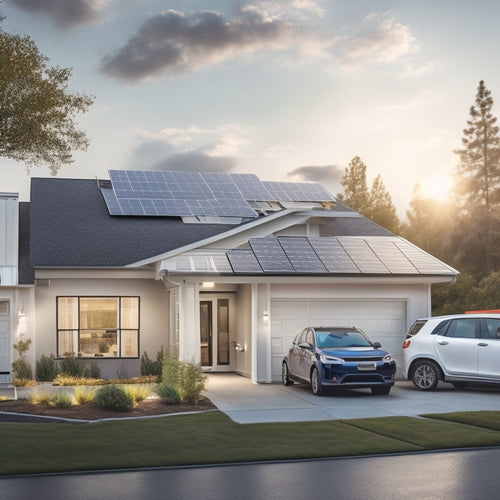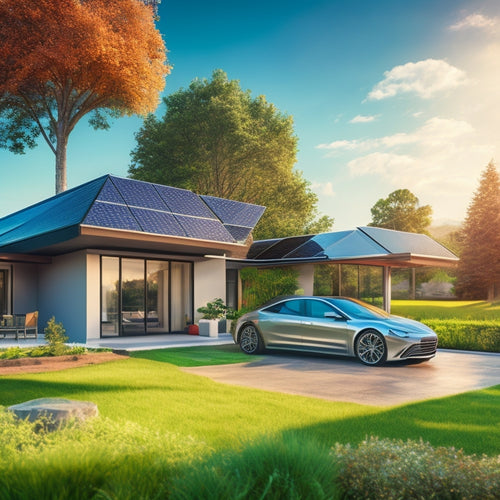
Best Solar Inverters for Home Energy
Share
When selecting the best solar inverter for your home energy, you'll want to evaluate top brands like Enphase, SMA, and Fronius, which offer high-quality performance, reliable warranties, and continuous product updates. Key features to look for include battery integration, smart monitoring, and high efficiency ratings. You'll also need to decide between grid tie inverters, string inverters, and microinverters, depending on your installation requirements and energy needs. By choosing an inverter that meets your specific needs, you'll maximize energy production and minimize losses. Now, examine the key factors to assess when making your decision.
Key Takeaways
- Top brands like Enphase, SMA, and Fronius offer high-quality inverters with reliable performance and better warranty terms.
- Consider key features like battery integration, smart monitoring, and high efficiency when selecting a solar inverter for home energy.
- Grid tie inverters with high efficiency ratings (above 98%) minimize energy losses and optimize energy production and consumption.
- String inverters offer lower costs, but microinverters provide individual power conversion and precise monitoring for maximum energy harvesting.
- Look for inverters with high conversion efficiency rates and durable designs to maximize usable energy production and reduce energy loss.
Top Solar Inverter Brands
Your solar panel system's efficiency relies heavily on the inverter, which converts DC power into usable AC power for your home. When selecting an inverter, you should consider the brand reputation and its impact on the overall performance of your system.
Reputable brands like Enphase, SMA, and Fronius offer high-quality inverters with excellent customer support. These brands have established themselves as industry leaders, providing reliable and efficient inverters that can withstand various environmental conditions.
A brand's reputation is essential because it directly affects the quality of the inverter and the level of customer support you can expect. A reputable brand will provide better warranty terms, faster response times, and more thorough support.
You'll have peace of mind knowing that your inverter is backed by a brand that stands behind its products. Additionally, a reputable brand will continually update and improve its products, guaranteeing that your inverter remains compatible with future solar panel technology advancements.
Key Features to Consider
When selecting a solar inverter, you'll need to evaluate several key features to confirm the device meets your energy needs and integrates seamlessly with your solar panel system.
One essential aspect is battery integration, which allows you to store excess energy generated by your solar panels for later use. Look for an inverter that supports advanced battery management systems, enabling efficient charging and discharging.
Another important feature is smart monitoring, which provides real-time information into your solar panel system's performance. This enables you to identify potential issues, optimize energy production, and receive alerts in case of malfunctions.
Make sure the inverter comes with a user-friendly monitoring platform that offers remote access and data analytics.
Additionally, consider the inverter's compatibility with your solar panel system's specifications, including voltage and current ratings.
You'll also want to evaluate the device's efficiency, maximum power point tracking (MPPT) capabilities, and certifications from reputable organizations like UL and IEEE.
Grid Tie Inverter Options
The roof of your home is now a power plant, generating clean energy with each passing day, thanks to your solar panel system. An important component of this system is the grid tie inverter, which converts DC power from your solar panels into AC power that's usable in your home and exportable to the grid.
When selecting a grid tie inverter, you'll need to take into account the specific installation requirements of your system, including the type and number of panels, as well as the grid connection requirements in your area.
Grid tie inverters come in a range of sizes and efficiencies, so it's vital to choose one that's compatible with your system's specifications. Look for an inverter with a high efficiency rating (typically above 98%) to minimize energy losses.
Additionally, think about an inverter with advanced monitoring and control features, such as remote monitoring and smart grid capabilities, to optimize your energy production and consumption.
String Inverter Vs Microinverter
Grid tie inverters are just one type of inverter technology available for home solar systems. You're likely considering string inverters and microinverters, two popular options. So, what's the difference?
A string inverter connects multiple solar panels in a series, converting the DC power to AC power in one central unit. This design offers several benefits, including lower upfront costs, easier installation, and simpler monitoring.
However, if one panel is shaded or underperforming, it can affect the entire string's output.
Microinverters, on the other hand, are installed beneath each solar panel, converting DC power to AC power individually. This design provides several advantages, including maximum energy harvesting, even if one panel is shaded or malfunctioning.
Microinverters also offer more precise monitoring and troubleshooting capabilities. While they're more expensive upfront, microinverters can provide a higher return on investment in the long run.
Ultimately, the choice between a string inverter and microinverters depends on your specific energy needs and system design.
Inverter Efficiency and Reliability
When selecting a solar inverter for your home energy system, you'll want to prioritize high conversion efficiency rates, as they directly impact the amount of usable energy your system produces.
Durable inverter designs also matter, as they guarantee your system operates reliably over its lifespan.
High Conversion Efficiency Rates
With solar energy systems, every watt counts, and high conversion efficiency rates are essential to maximize your home's energy production.
You want to guarantee that your solar inverter can convert the maximum amount of DC power from your solar panels into usable AC power for your home.
High conversion efficiency rates are critical to achieving this goal. A higher efficiency rate means more energy savings for you.
Here are three key benefits of high conversion efficiency rates:
-
Maximum Energy Harvesting: A high-efficiency inverter guarantees that you're generating the most energy possible from your solar panel system, reducing waste and maximizing your energy savings.
-
Reduced Energy Loss: Inverters with high conversion efficiency rates minimize energy loss during the conversion process, resulting in more power for your home and less heat generated by the inverter.
-
Improved ROI: By maximizing your energy production, you'll see a faster return on investment for your solar technology, making it a more cost-effective option for your home.
Durable Inverter Designs Matter
Your solar inverter's design plays an essential role in its overall performance and longevity, as a long-lasting inverter is better equipped to withstand the rigors of constant energy conversion.
A well-designed inverter can greatly extend its lifespan, guaranteeing you get the most out of your solar energy investment. One critical aspect of durable inverter design is weather resistance.
You want an inverter that can withstand harsh outdoor conditions, such as extreme temperatures, humidity, and exposure to the elements. Look for inverters with IP65 or higher ratings, which promise protection against dust and water ingress.
Additionally, consider inverters with a wide operating temperature range, typically between -40°C to 60°C, to ascertain continuous performance in various environments.
A durable inverter design also involves the use of high-quality components, sturdy circuitry, and a reliable cooling system.
Cost and Warranty Comparison
Five top-tier solar inverter brands offer varying price points and warranty terms, making it essential to compare these factors to guarantee the best value for your investment.
You need to evaluate the total installation costs, including the inverter, installation, and maintenance expenses. A higher upfront cost may be offset by longer warranty terms, reducing your long-term expenses.
Here are the key cost and warranty comparisons to evaluate:
-
Enphase Energy: Offers a premium product with a higher upfront cost, but provides an extensive 25-year warranty, ensuring minimal maintenance expenses.
-
SolarEdge: Provides a more affordable option with a 12-year warranty, which can be extended to 20 or 25 years for an additional fee.
-
Huawei: Offers a competitive pricing strategy with a 10-year warranty, which can be extended to 15 years for an additional fee.
Frequently Asked Questions
Can I Install a Solar Inverter Myself, or Do I Need a Professional?
"Don't bite off more than you can chew" - attempting a DIY installation might save you money, but it's vital to prioritize inverter safety; unless you're an expert, it's recommended to hire a professional to guarantee a secure and efficient setup.
How Often Should I Clean My Solar Panels to Ensure Optimal Performance?
You should clean your solar panels every 6-12 months, depending on your location's climate and pollution levels, to guarantee peak performance through regular solar panel maintenance, as peak cleaning frequency varies to maximize energy output.
Do Solar Inverters Work During a Power Outage or Grid Failure?
When the grid fails, you're left in the dark, but some solar inverter types, like grid-tied systems with backup capabilities, can keep your lights on, ensuring you're not stuck in the dark, as long as you've got a battery bank to store excess energy.
Can I Use a Solar Inverter With a Battery Backup System?
You can use a solar inverter with a battery backup system, ensuring battery inverter compatibility, by selecting an inverter designed for solar energy storage, which enables you to store excess energy for later use during grid outages or nighttime consumption.
Are Solar Inverters Compatible With All Types of Roofing Materials?
You'll be amazed to know that over 90% of US homes are suitable for solar installations. When it comes to roofing material compatibility, you'll find that most solar inverters can be installed on asphalt shingle, metal, or tile roofs, as long as they meet specific installation requirements.
Related Posts
-

What Electric Vehicle Owners Need for Home Energy
As an electric vehicle owner, you need to optimize your home energy system to guarantee efficient, sustainable, and c...
-

What Solar Panels Work Best With EVS Online?
When shopping for solar panels online to power your electric vehicle, look for high-efficiency models that can withst...
-

What Makes a Road Bike-Friendly by Design?
As you plan and design roads, incorporating features like dedicated bike lanes, smooth surfaces, and traffic calming ...


